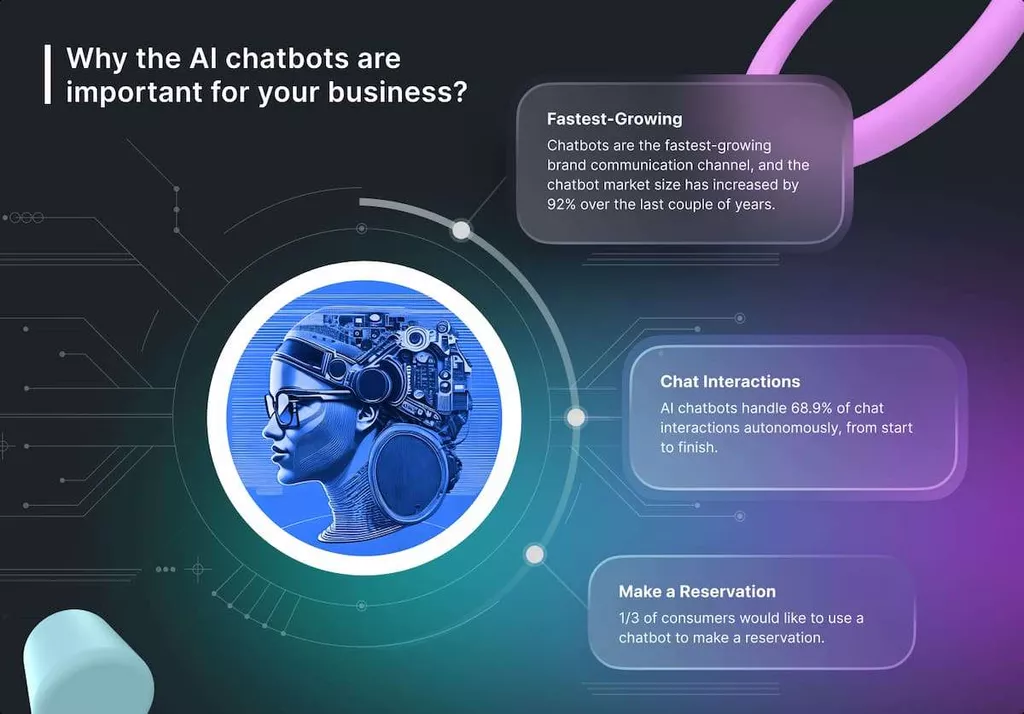Artificial intelligence (AI) has revolutionized several industries, with chatbots being one of its most well-known applications. In the modern business context, chatbots have become essential for streamlining interactions and boosting customer engagement. In this article, we will analyze what are the pros and cons of AI chatbots and examine the challenges associated with their deployment.
Understanding AI chatbots
AI Chatbots are computer programs designed to mimic human conversation using artificial intelligence. They interact with users, answer queries, and perform tasks based on pre-set rules or by learning from past interactions. Their key aspect is conversational AI, a subfield of AI that enables machines to understand, process, and respond to human language naturally. AI technology is pivotal in customer service automation, providing instantaneous, personalized responses and reducing operational costs.

Benefits of using AI chatbots in customer support
Bots have quickly become a business game-changer. As companies navigate the challenges of implementing them, understanding what are the benefits of AI chatbots facilitates more informed decisions. Here are the major AI chatbot benefits that will enhance your business:
- 24/7 customer service: AI chatbots provide 24/7 client support, unlike human representatives who need rest. This availability improves customer satisfaction, as consumers get their issues resolved or questions answered regardless of the time or day.
- Cost savings: Bot integration leads to substantial cost savings in the long run. While dealing with routine queries and tasks, they free up human agents’ time to handle complicated issues. It decreases the need for a large client service team, thus saving on staffing costs.
- Instant response: Conversational bots respond to consumer queries instantly, cutting wait times. Such a quick reaction time boosts client satisfaction, especially when they expect immediate assistance.
- Scalability: Chatbots handle multiple interactions simultaneously, something human agents can’t match. This scalability allows businesses to manage increasing customer queries without additional staffing, making it beneficial during peak business periods.
- Data collection and analysis: All the bots gather a wealth of customer data and offer actionable insights to businesses. This information can improve products, services, and consumer interaction strategies, providing a competitive edge in the market.
- Personalization: Based on previous encounters and client preferences, they provide individualized customer experiences. Client engagement and loyalty are elevated as a result of such personalization.
- Streamlined operations: AI chatbots automate various operational tasks, from booking appointments to answering FAQs, leading to smoother and more efficient business operations.
AI chatbots are strategic tools revolutionizing client support with constant availability and personalized experiences. AI chatbot benefits like automation of typical assignments and data analysis promote company development and consumer understanding. You can learn more about the real results a chatbot brings to business in our Fozzy case study.
Possible AI chatbots challenges your business may face
Companies implementing conversational AI solutions face some difficulties even if it promises to enhance customer support productivity. Businesses should be mindful of the possible hazards as they work to maximize the advantages of AI chatbots. Now let’s look at the top 7 drawbacks of AI chatbots.
- Limited understanding capabilities: Despite advancements in natural language processing, chatbots still need help with complex consumer queries. Misinterpretation leads to incorrect replies and, in turn, lowers customer satisfaction. Human intervention becomes necessary in such scenarios to ensure effective communication.
- Low rate of personalization: Smartbots provide 24/7 customer assistance but need more personal touch. Customer preference is often for human involvement in delicate or emotionally charged circumstances. For optimal customer experience, businesses must balance automation and human involvement.
- Data privacy concerns: Smart bots must access vast customer data to function effectively. It raises fair concerns about data security and privacy. Businesses need robust security measures to gain customer loyalty and comply with data protection standards.
- High initial investment: Developing, implementing, and maintaining AI chatbots requires a significant initial investment. While the bots promise cost savings in the long run, smaller businesses may find the upfront costs prohibitive.
- Lack of empathy: Despite sophisticated programming, AI chatbots can’t empathize. They need help understanding the emotional nuances that are a significant part of human communication. Such a lack of emotional intelligence leads to customer frustration or dissatisfaction, as bots may appear indifferent to their concerns.
- Difficulty in recognizing slang or idioms: Chatbots are programmed to understand language based on the data they are trained on. However, they often need help understanding informal language. Misinterpretations lead to incorrect responses and potentially cause negative experiences.
- Reliance on Internet connectivity: Artificial Intelligence chatbots rely on robust, uninterrupted Internet connectivity. Issues hamper functionality, resulting in delayed or incomplete customer service.
Harnessing the potential of AI chatbots requires businesses to navigate challenges, from implementation limitations to data security. With a strategic mindset, reducing these risks while maximizing AI chatbot benefits is possible. Moreover, looking beyond the initial investment to long-term value is crucial in fully exploiting the technology’s potential.
Conclusion
As you see, using these high-tech solutions comes with its own challenges and benefits of AI chatbots. Asking for expert assistance is prudent if you’re considering enhancing customer support through AI technologies. We excel in customer support automation and have developed a unique chatbot that executes business tasks.
Our chatbot successfully deals with up to 87% of customer inquiries, significantly reducing the agent’s routine workload. If you are interested in integrating a chatbot, but you’ve never done this, we offer to try the MetaDialog solution for free. This experience will help you understand if automating customer support with high-tech solutions is worth it.
